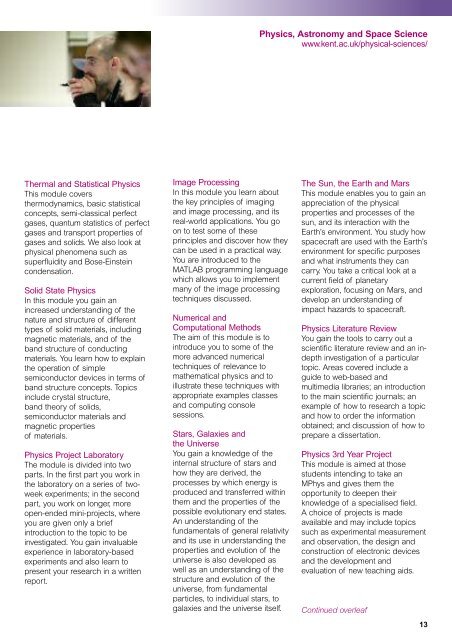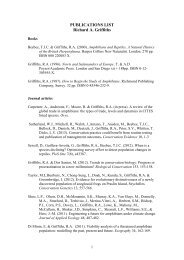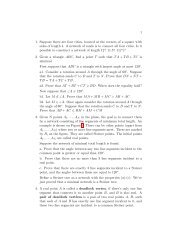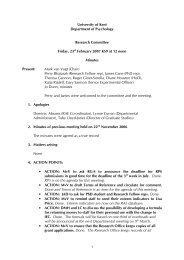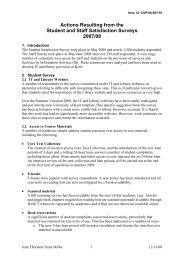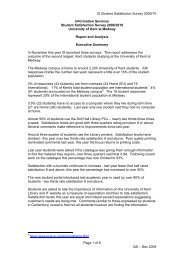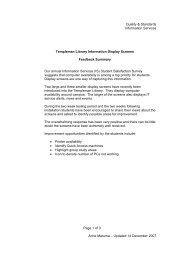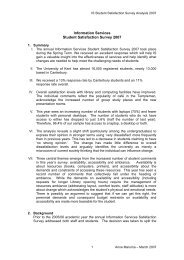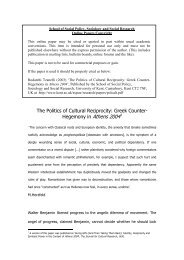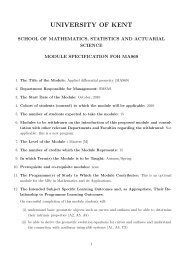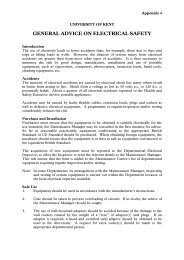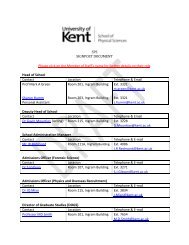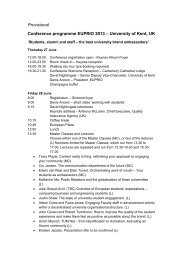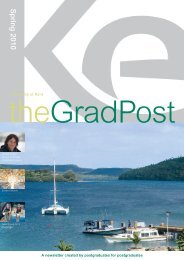Physics, Astronomy and Space Science - University of Kent
Physics, Astronomy and Space Science - University of Kent
Physics, Astronomy and Space Science - University of Kent
Create successful ePaper yourself
Turn your PDF publications into a flip-book with our unique Google optimized e-Paper software.
<strong>Physics</strong>, <strong>Astronomy</strong> <strong>and</strong> <strong>Space</strong> <strong>Science</strong><br />
www.kent.ac.uk/physical-sciences/<br />
Thermal <strong>and</strong> Statistical <strong>Physics</strong><br />
This module covers<br />
thermodynamics, basic statistical<br />
concepts, semi-classical perfect<br />
gases, quantum statistics <strong>of</strong> perfect<br />
gases <strong>and</strong> transport properties <strong>of</strong><br />
gases <strong>and</strong> solids. We also look at<br />
physical phenomena such as<br />
superfluidity <strong>and</strong> Bose-Einstein<br />
condensation.<br />
Solid State <strong>Physics</strong><br />
In this module you gain an<br />
increased underst<strong>and</strong>ing <strong>of</strong> the<br />
nature <strong>and</strong> structure <strong>of</strong> different<br />
types <strong>of</strong> solid materials, including<br />
magnetic materials, <strong>and</strong> <strong>of</strong> the<br />
b<strong>and</strong> structure <strong>of</strong> conducting<br />
materials. You learn how to explain<br />
the operation <strong>of</strong> simple<br />
semiconductor devices in terms <strong>of</strong><br />
b<strong>and</strong> structure concepts. Topics<br />
include crystal structure,<br />
b<strong>and</strong> theory <strong>of</strong> solids,<br />
semiconductor materials <strong>and</strong><br />
magnetic properties<br />
<strong>of</strong> materials.<br />
<strong>Physics</strong> Project Laboratory<br />
The module is divided into two<br />
parts. In the first part you work in<br />
the laboratory on a series <strong>of</strong> twoweek<br />
experiments; in the second<br />
part, you work on longer, more<br />
open-ended mini-projects, where<br />
you are given only a brief<br />
introduction to the topic to be<br />
investigated. You gain invaluable<br />
experience in laboratory-based<br />
experiments <strong>and</strong> also learn to<br />
present your research in a written<br />
report.<br />
Image Processing<br />
In this module you learn about<br />
the key principles <strong>of</strong> imaging<br />
<strong>and</strong> image processing, <strong>and</strong> its<br />
real-world applications. You go<br />
on to test some <strong>of</strong> these<br />
principles <strong>and</strong> discover how they<br />
can be used in a practical way.<br />
You are introduced to the<br />
MATLAB programming language<br />
which allows you to implement<br />
many <strong>of</strong> the image processing<br />
techniques discussed.<br />
Numerical <strong>and</strong><br />
Computational Methods<br />
The aim <strong>of</strong> this module is to<br />
introduce you to some <strong>of</strong> the<br />
more advanced numerical<br />
techniques <strong>of</strong> relevance to<br />
mathematical physics <strong>and</strong> to<br />
illustrate these techniques with<br />
appropriate examples classes<br />
<strong>and</strong> computing console<br />
sessions.<br />
Stars, Galaxies <strong>and</strong><br />
the Universe<br />
You gain a knowledge <strong>of</strong> the<br />
internal structure <strong>of</strong> stars <strong>and</strong><br />
how they are derived, the<br />
processes by which energy is<br />
produced <strong>and</strong> transferred within<br />
them <strong>and</strong> the properties <strong>of</strong> the<br />
possible evolutionary end states.<br />
An underst<strong>and</strong>ing <strong>of</strong> the<br />
fundamentals <strong>of</strong> general relativity<br />
<strong>and</strong> its use in underst<strong>and</strong>ing the<br />
properties <strong>and</strong> evolution <strong>of</strong> the<br />
universe is also developed as<br />
well as an underst<strong>and</strong>ing <strong>of</strong> the<br />
structure <strong>and</strong> evolution <strong>of</strong> the<br />
universe, from fundamental<br />
particles, to individual stars, to<br />
galaxies <strong>and</strong> the universe itself.<br />
The Sun, the Earth <strong>and</strong> Mars<br />
This module enables you to gain an<br />
appreciation <strong>of</strong> the physical<br />
properties <strong>and</strong> processes <strong>of</strong> the<br />
sun, <strong>and</strong> its interaction with the<br />
Earth’s environment. You study how<br />
spacecraft are used with the Earth’s<br />
environment for specific purposes<br />
<strong>and</strong> what instruments they can<br />
carry. You take a critical look at a<br />
current field <strong>of</strong> planetary<br />
exploration, focusing on Mars, <strong>and</strong><br />
develop an underst<strong>and</strong>ing <strong>of</strong><br />
impact hazards to spacecraft.<br />
<strong>Physics</strong> Literature Review<br />
You gain the tools to carry out a<br />
scientific literature review <strong>and</strong> an indepth<br />
investigation <strong>of</strong> a particular<br />
topic. Areas covered include a<br />
guide to web-based <strong>and</strong><br />
multimedia libraries; an introduction<br />
to the main scientific journals; an<br />
example <strong>of</strong> how to research a topic<br />
<strong>and</strong> how to order the information<br />
obtained; <strong>and</strong> discussion <strong>of</strong> how to<br />
prepare a dissertation.<br />
<strong>Physics</strong> 3rd Year Project<br />
This module is aimed at those<br />
students intending to take an<br />
MPhys <strong>and</strong> gives them the<br />
opportunity to deepen their<br />
knowledge <strong>of</strong> a specialised field.<br />
A choice <strong>of</strong> projects is made<br />
available <strong>and</strong> may include topics<br />
such as experimental measurement<br />
<strong>and</strong> observation, the design <strong>and</strong><br />
construction <strong>of</strong> electronic devices<br />
<strong>and</strong> the development <strong>and</strong><br />
evaluation <strong>of</strong> new teaching aids.<br />
Continued overleaf<br />
13


